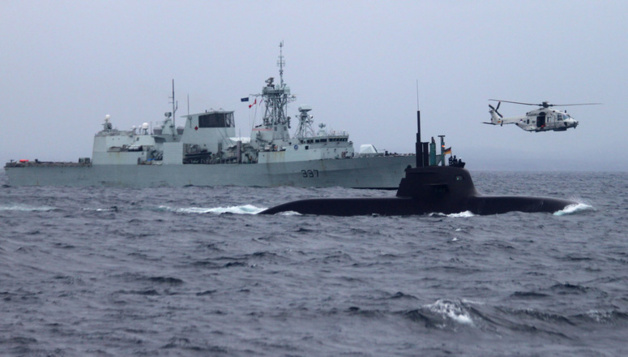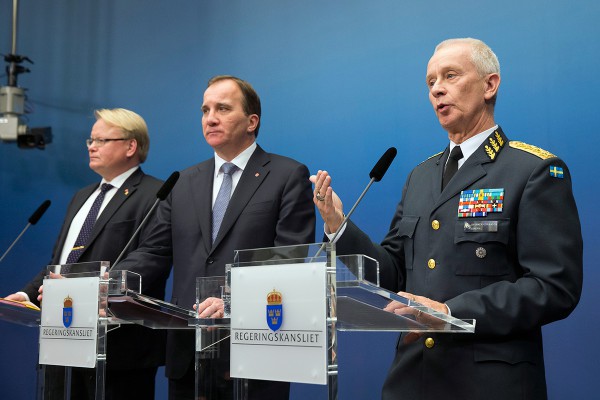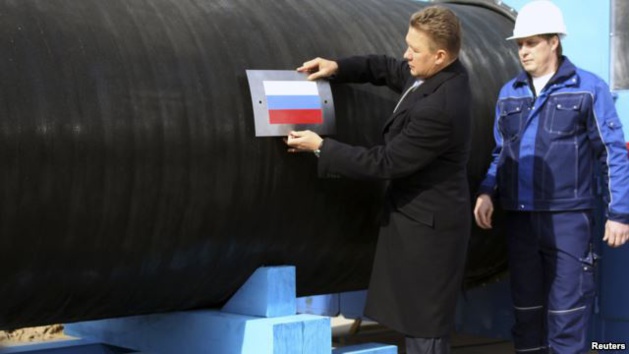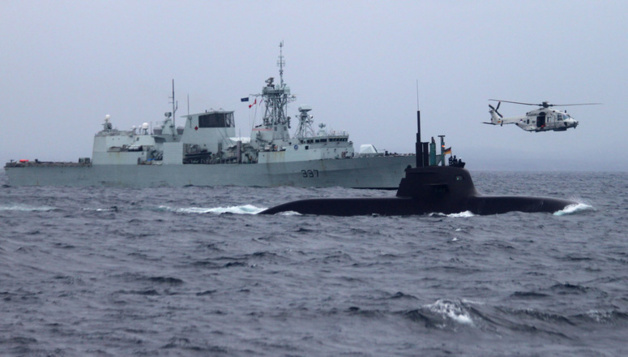
Launch of the anti-submarine warfare « Dynamic Mongoose » off the Norwegian coasts - Crédit: NATO
The recent Ukrainian crisis had some consequences on North European countries, which were forced to react and review their defence strategy to protect themselves from Russian policies. The annexation of Crimea and the recent Russian military operations which were organised in the Baltic Sea have worried Sweden.
On May 21st 2015, Peter Hultqvist, Swedish Defence minister said he would recommend placing about 150 soldiers onto Gotland Island in order to protect it from Russian policies, such as the Crimea annexation in 2014. “We have seen the Russian assaults since the war in Georgia in 2008 and the militarization as well as the violent reaction of Kremlin. The Russian militarization and those recent assaults are a reality that we, the social democratic party, have faced during these seven last years. We will keep analysing the Russian facts and actions and face this reality with our Baltic neighbours”, reveals Marinette Nyh Radebo, press secretary for the Swedish Defence Ministry.
This decision comes to disturb the quietness of the island, which was a demilitarized zone since a decade. According to Marinette Nyh Radebo, « this Swedish military presence on and around Gotland will lead to a stabilisation of the Baltic region. The reinforcement of the military presence, called “Battle group Gotland ", will include a mechanized infantry company and a reserve armoured company. Local home guard forces will also been reinforced.
The Swedish government also expressed its intention to increase its military spending to 5.5 million of kroners, so that is 600 million euros. For Marinette Nyh Radebo, « that’s the first time in more than two decades that the Swedish government decide to increase the Defence budget to 11% for the next five years, so that is an increase of 2,2% per year ». Furthermore, the percentage of Defence budget in the Sweden’s Gross Domestic Product had been halved since the end of the Cold War.
According to Peter Hultqvist, these governmental decisions are made in order to affirm the Swedish power: « We are doing everything to highlight Sweden sovereignty», he said. A first stage would be voting a new defence law applicable from 2016 to 2020. This bill, passed in Swedish Parliament on the 16th June of 2015 with 75% of Members of Parliament in favour, deals with the principles which were formulated in the reports presented to parliamentary committees Choices in a globalized world (2013) and The Defence of Sweden – a stronger defence for an uncertain time (2014).
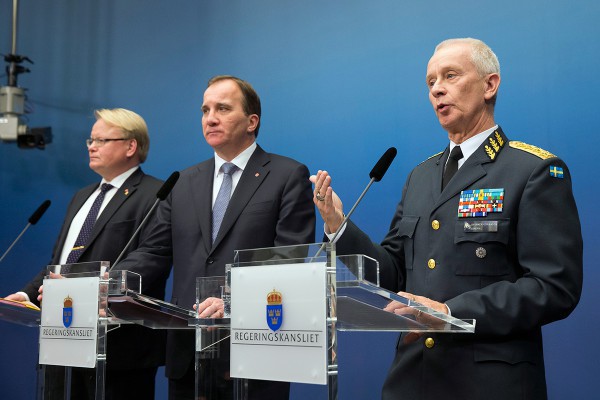
The top priorities of this bill are the following : « strengthen the regional interest by focusing more on defence and national planning for what occurs in time of war ; substantial investments in Defence Forces ; one more mechanized battalion ; remilitarization on Gotland ; the upgrading of tanks and infantry combat vehicles as well as new mortars for mechanized battalions ; new anti-tank weapons ; to strengthen the anti-submarine warfare capacity ; investments in recruitment and maintenance of the troops ; a modernized civil defence, which means a civil society working in close cooperation with the armed forces ; etc. », reveals Marinette Ny Radebo to the Journal international.
Sweden had already known earlier this year such worries concerning its sovereignty in the Baltic Sea. On March 16th, Sweden announced its will to strengthen its anti-submarine warfare capacities. This decision was a reaction to the presence of a Russian submarine in its territorial waters in October, along Stockholm. The increase of military spending scheduled by the Swedish government by 2020 will allow modernising the submarines and detection equipment.
Sweden has currently five submarines of which three are located in Gotland, put into service between 1996 and 1997. The two others submarines are repatriated in Vastergotland and have not been put into service since 1990. The country wish also extend its fighter aircraft fleet from 60 to 70 aeroplanes JAS 39E.
Gotland at the centre of European alliances and tensions with Russia
It is also important to say that this fear for Russia and the recent events in Crimea have also led to military reactions from NATO which has intensified its military operations in Baltic countries and Poland. According to Marinette Nyh Radebo, « the security, in Europe, has worsened these last years, and to cooperate with our partners is the only solution to ensure a safe environment but also to reach interoperability with those partners. Moreover, these operations, which had already taken place in the past, allow us to show our presence in the region ».
From May 25th to June 5th, 115 planes and 3,600 soldiers from five NATO’s member states and three neutral countries were involved in operations on Gotland: the United States, the United Kingdom, France, Netherlands, Germany, Finland, Switzerland and Sweden. It has to be noted that Sweden is a NATO partner without being one of its members. The practice flights of the NATO Artic Challenge 2015 simulated for instance a UN’s peacekeeping, followed by NATO Balltops (Baltic Operation) involving4, 500 soldiers from seventeen countries.
These NATO actions respond to recent Russian military operations in the Baltic region: about 1,200 soldiers as well as 250 Russian fighter aircrafts have participated at numerous drills between May 25th and May 29th. For Sweden, it is important to count on this cooperation with NATO, but also and especially with its neighbours. Marinette Nyh Radebo assures that Sweden is also going to “reinforce its cooperation with Nordic countries, especially with Finland, Baltic countries, EU, NATO and UN. Transatlantic link is of key importance, just like the European reaction to every single event which could endanger the European and international safety”
Furthermore, NATO has stopped any cooperation with Russia since April 2014 and officially disapproved in autumn 2014 the Russian military intervention in Ukraine, accusing Russia of occupying Crimea illegally. The organization also announced in a communiqué on November 28th 2014: “NATO has responded to the new strategic reality due to Russian illegal actions by reinforcing the Allies defence, and by guaranteeing its capacity to increase and improving the infrastructures if it’s necessary.”
Disagreement about Nord Stream, Russian pipeline crossing Sweden economic zone
Europe is facing in recent decades a weakening of its gas national production while needs stay the same, which contribute to endanger the new capacities of transport. Russia is one of the greatest gas suppliers in Europe. A project of two pipelines could soon create a new way: the North European Gas Pipeline (Nord Stream) aims to allow the Russian gas exportation in Europe through more than 1,200km offshore in the Baltic Sea. This pipeline is expected to respond to 25% of the increasing gas needs in the European Union in 2015.
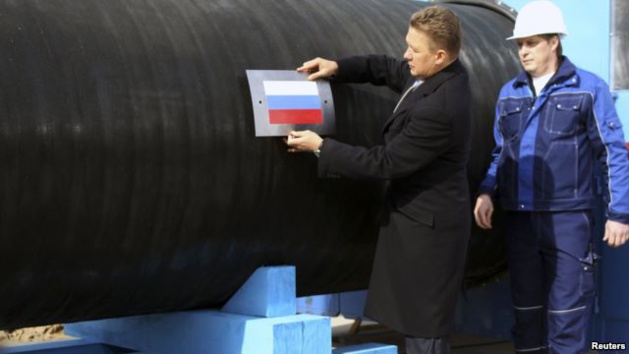
Nevertheless, the latter comes to disturb Sweden’s sovereignty because even if the pipeline’s itinerary does not cross Swedish territorial waters, it crosses the Swedish economic zone, as well as the Finnish, Danish and German ones. Russia wants to strengthen its military presence in this region in order to protect the North European Gas Pipeline linking Germany to Russia. This safety measure involves an increased presence of Russian soldiers around Gotland and therefore the exclusive Swedish economic area, considered as an act of provocation towards the country sovereignty.
Those pipelines provoked the indignation of numerous Baltic countries as well as Poland and Latvia because Nord Stream project enables the bypassing of Poland, Belorussia and Ukraine. With this new pipeline itinerary, Russia has all the powers to influence the choices of all the countries that depend economically on Russian gas: 80% of the Russian gas exportations are passing through Ukraine. The pipeline project is accused of lack of transparency by the European Parliament in a document published in 2007 by Directorate General for Internal Policies.
Russian Military waste in Baltic Sea: environmental risk for Gotland
In 2010, a documentary released by the Swedish channel SVT revealed that Russian ships carried away military waste, probably backdated from a former Soviet military base in Latvia between 1989 and 1992, to throw them away in the Baltic Sea, near Gotland. The public channel also proved that some members of the Swedish government had known about Soviet soldier’s operations without any reaction at the time. After the documentary’s diffusion, several Swedish politicians had asked for an official investigation.
In addition to those radioactive wastes, the Swedish maritime space has to face several thousand tons of chemical weapons which have been thrown out in the Baltic Sea since 1945. Between 40,000 and 50,000 tons of chemical weapons were found in the Baltic Sea. Gotland’s environment is well-known for its wonderful fauna and flora diversity, and such waste can be dangerous for fishing, major source of income of the Swedish Island.
A lot of reserves are already protected in the island, which is registered on the UNESCO world heritage, but it could be insufficient in case of a contamination. Gotland’s inhabitants have voted a lot of laws to limit the impact of all kind of economic and touristic sectors on the environment. A radical strategy was launched on the Island, in 1996, in order to become a model of ecologic society in every single field such as energy, resources, pollution, farming, wastes and radiation.














